One of the biggest mistakes you can make when trying to build or create something, achieve a personal goal, or make change in your life, is trying too hard.
And no, I don’t mean working too hard, that’s essential. But, TRYING too hard kills more projects and personal goals, than anything else.
Whether it’s a business project, personal change, or saving money, beware of trying too hard.
It’s a dream killer.

What Happens When You Try Too Hard?
When you start a new project your enthusiasm and motivation levels are at an all-time high. So, you charge at the challenge giving it your all, every single day.
Every bone in your body and thought in your mind is obsessed, and devoted to your goal. Each spare moment you have is dedicated to the challenge. You’re motivated beyond your wildest dreams. Determined to win this time.
But then you hit a wall. Whether it’s through boredom, frustration, or exhaustion, your enthusiasm slows down.
You start to skip days here and there, shorten the hours you work, or take a day off.
A few more weeks go by, and you’re totally over it.
Back to life on the couch, wondering what the hell went wrong.
Your self-limiting beliefs are back in control again.
Trying Too Hard Happens to us All
Sound familiar? Of course, it DOES!
It happens to us ALL!
I’m not immune to it. Far from it! I wish I WAS!
The good news is it comes down to just a few things. With a few adjustments, I can show you how to keep going on any project, business idea, or self-improvement you want to achieve in your life.
Let’s start with the first thing that stands in your way of progress.
Like so many things in life, it starts with your ego.
Your Ego Starts the Problem
I’m not suggesting you’re egotistical, or a narcissist. Far from it! You’re a normal person just like me, or anyone else.
You tried to make a few adjustments and started making positive changes. It just didn’t work out the way you planned. You failed to change your life the way you wanted to.
Join the club! We’ve ALL been THERE!
Millions of people just like you and I, every day, attempt to do something new, quit, and feel like a failure.
Been There, Got the T-shirt
It’s happened to me SO many times, I’ve got a collection of t-shirts to prove it.
And yes, I mean literally. I do my own branding and make my own shirts. So, I make new t-shirts when I start a new project.
I did the same thing with No More Net Zeros, too.
Check out my shirts here.
Anyway, let’s get back to talking about the ego problem.
Why is your ego the main issue here?
The Problem with Imaginary Timelines
When you start a project or goal, your ego creates an imaginary timeline for how long it should take to succeed or see visible progress.
I want you to read the above statement again.
Read it a few times, until you begin to see the problem at hand.
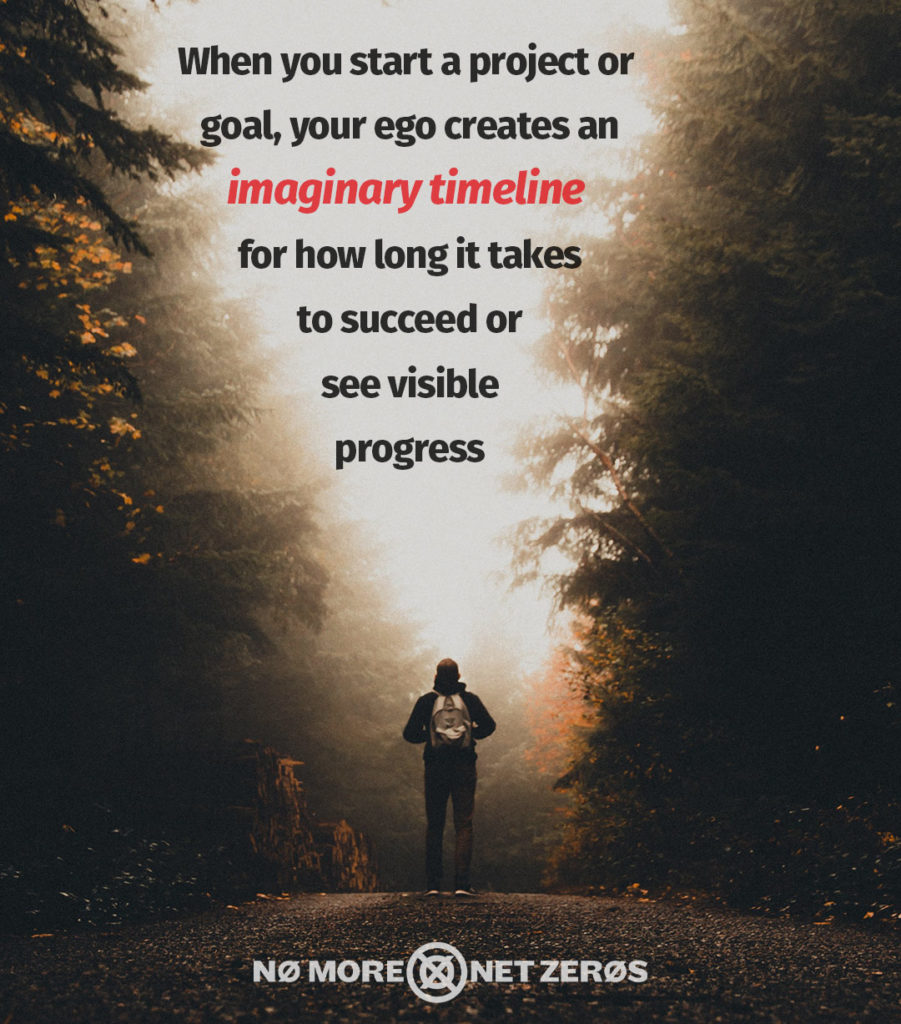
Here’s a closer look at the issue:
- You’re starting something you’ve never done before, or you’ve never succeeded at it yet. So, the amount of successful experience you have IS… … ZERO
- Then, you decide this thing you’ve never done before, should take X amount of time
- Your ego creates an imaginary timeline, by which you expect to see progress. This could be the time it takes to make your first dollar, or maybe lose the first 10 pounds
- Goals are set, based on those expectations. The problem is you have no idea if the action you’re taking, CAN achieve those results
- If you don’t hit imaginary goals you made-up for yourself, you get frustrated. Maybe you even try a little harder for a moment.
- You get demoralized, because you didn’t make the progress you expected to, within the imaginary timeline, YOU invented.
By the time you get to this stage, it’s already over.
Your Project was Doomed from the Start
Your ego set you up for failure. You were doomed from the beginning.
It’s not ALL bad news. You got a few things wrong in your approach, that’s all.
At the beginning, your motivation got you started. But ego-driven motivation never lasts long. The same ego that got you started kills it off, just as fast.
If things are driven by ego and motivation, they won’t last the distance.
This is a common problem, caused by underestimation.
So, your imaginary timeline needs some adjustment.
Everything is ALWAYS Ten Times Harder
With any goal, it’s always much harder than you think it’s going to be.
Everything in life is always 10 TIMES HARDER than you THINK it’s going to be.
I’ll say this again because it’s the key to this whole thing.
EVERYTHING in life is ALWAYS 10 TIMES HARDER than you THINK it’s going to be.
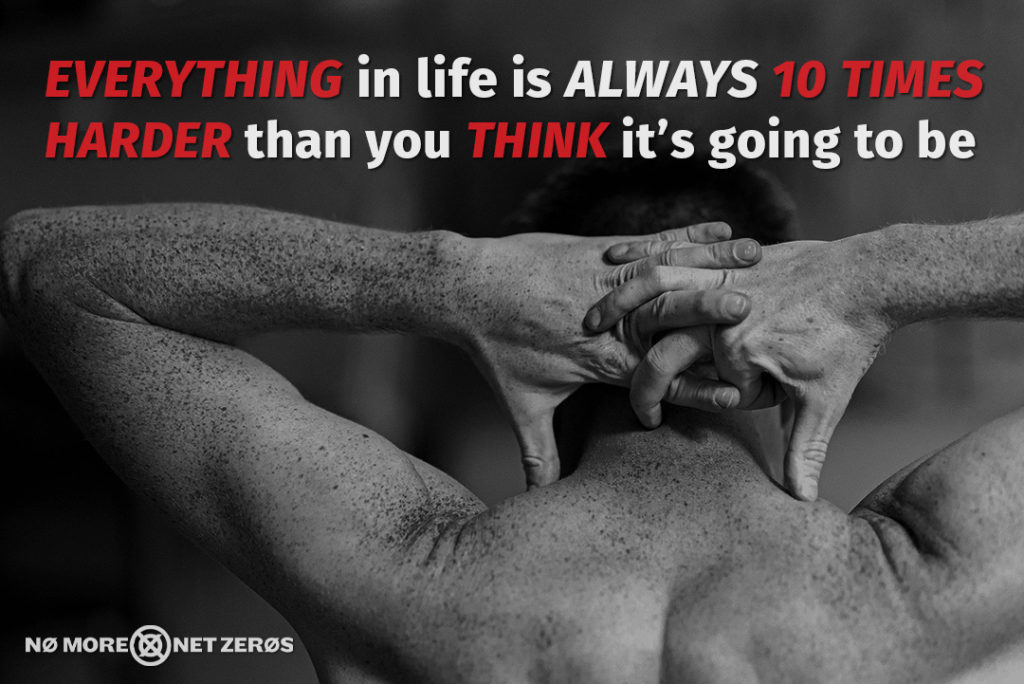
This is 100% normal, for everyone.
Even after many years of building, planning, projects, and businesses, this still happens to me. The difference is… …I know about it. I expect it, and don’t get frustrated if it happens. Now that you know this, YOU should expect it, too.
Your expectations will be much more realistic if you take your imaginary timeline, and times it by ten.
So, if you thought the project would take 5 weeks, extend it to 50 weeks, which is almost a year.
This might sound a little ridiculous, but honestly, it makes a lot more sense.
Here’s Bill Gates spin on it…
“Most people overestimate what they can do in one year, and underestimate what they can do in ten years.”
Bill Gates
…and Bill Gates knows a thing or two about achieving goals!
When you have realistic expectations, you begin to see the project in real terms, and plan accordingly.
Underestimation Causes Frustration
If your imaginary timeline was 5 weeks, and you’re nowhere near completion in 8 or 9 week, you’ll be frustrated with your progress. Even if you‘re making GREAT progress, you won’t see it that way.
If your timeline was a year, and you worked just as hard, producing the same results… …after 3 months, when you check your progress, you’d be MUCH happier!
Nothing changed, other than your perception of the progress being made.
You didn’t achieve MORE… …you framed the timeline correctly.
Now you’re happy with your result and remain motivated to keep going.
This is NOT a Compromise
Don’t confuse this with a compromise.
Whether you change your expectations or you don’t… …it WILL work out this way.
The difference is, if your expectations outweigh your ability, you’llget frustrated. More realistic expectations allow you to work steadily and achieve what you need to.
See it as a Challenge, not Difficult
When I look at something that’s going to take me a few years to do… …I get excited because NOW I can see a REAL CHALLENGE.
And who doesn’t love a good challenge!?
This isn’t an EASY project anymore… …now it’s a CHALLENGE!
NOW, how do you feel about your project?
It’s a different energy, isn’t it?
Now you’re going rise to your challenge, and win.
Stop Trying Hard, Start Working Hard
Nothing worth doing ever comes easily. You’ll always need to give it your all.
As I mentioned earlier, working hard, and trying hard, are completely different things.
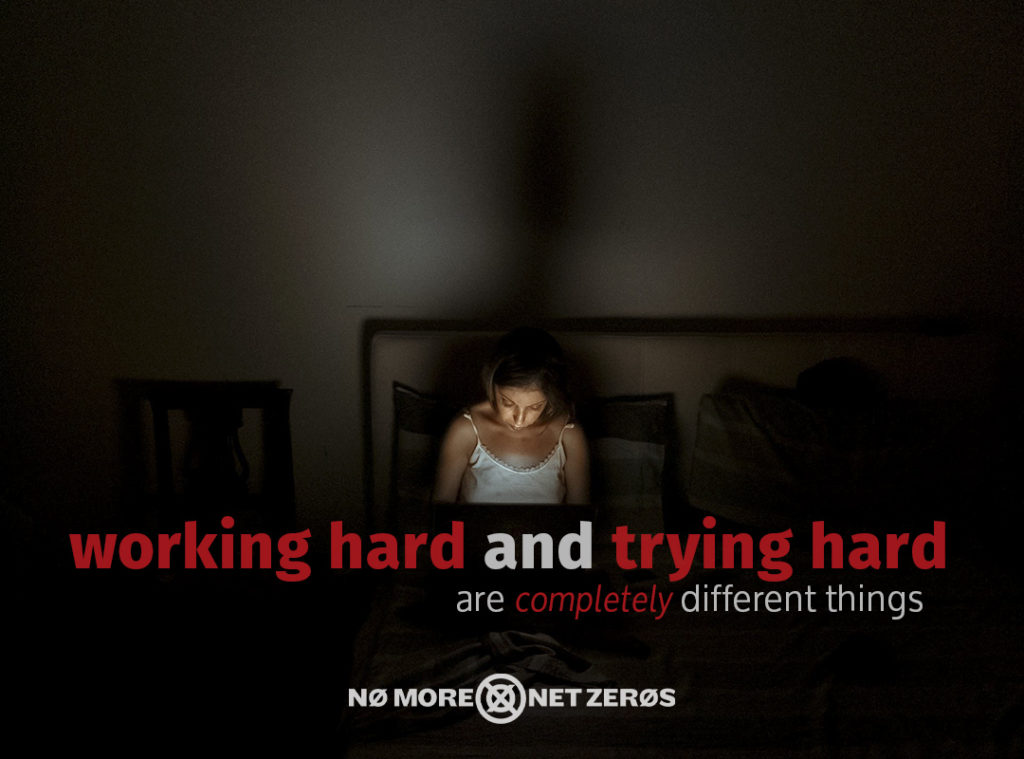
Working hard is required.
You already know this is going to be 10 times harder than you first thought. So, it’s going to take 10 times the work.
When you’re working hard and achieving things, completing even the smallest steps is motivating.
But, TRYING too hard, stops ALL motivation dead in its tracks. Trying too hard is a surefire way to get stressed, frustrated, and almost guarantees you’ll want to quit.
That’s why you’re feeling this way, and that’s why you wanted to give up, or worse, you did give up.
Stop Trying SO Hard, Right Now
If you feel like you’ve been trying too hard, stop everything you’re doing, immediately.
Stop everything you’re doing. Right now.
Today, you’re going to take a break.
It’s time to relax, completely.
Take a few hours off, or even a day, and read through this blog post.
When you’re done here you’re going to be ready to take on the world and have a perfect plan on how you’re going to do it.
All you need is to be totally relaxed, and have a focused mind to work with.
So, go grab a coffee, or your beverage of choice, and we’ll get to work on fixing this issue.
You’re Motivated, Not Calculated
When you go on a full-on charge, hustling and trying too hard until you make a difference, you’re running on pure motivation alone. This type of motivation is just empty calories. When the motivation runs out, you’ll be left with nothing in the tank.
There’s nothing wrong with motivation. But this sort of motivation, is like running hard as you can on the spot, hoping to spin the world faster, and bring your goals closer towards you.
You need calculated progress, with specific tasks to complete.
So, you need to be calculated, instead of motivated.
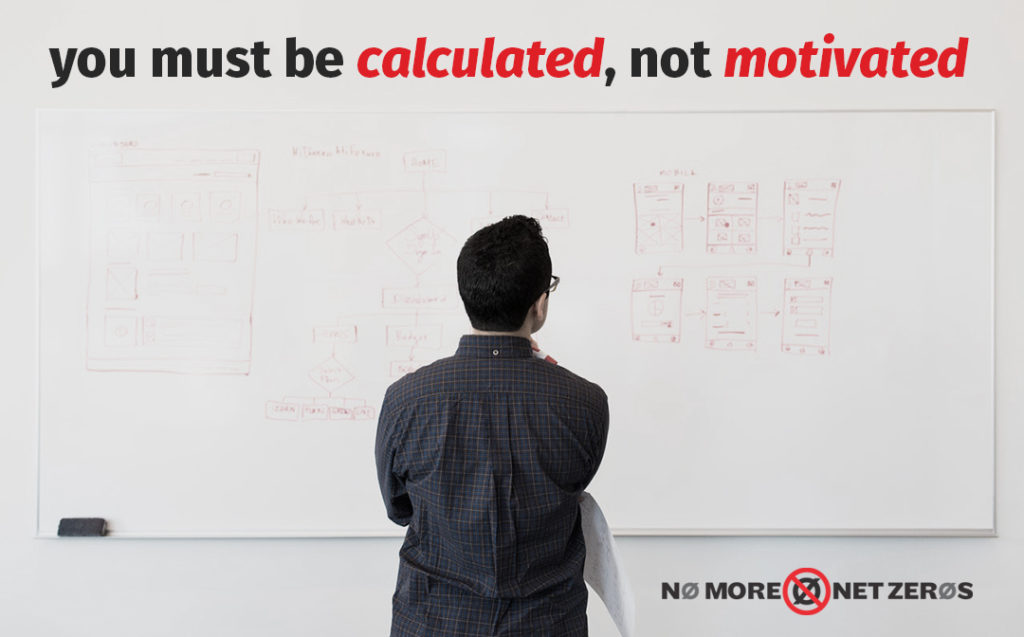
Don’t get me wrong, you DO need daily motivation to keep going. But you need to focus on being calculated.
You need to do the right things, at the right times, in the right order, to keep going in the right direction.
This sets the pace for consistent calculated progress. The momentum from this calculated progress compounds over time.
To guarantee this momentum, you need to make working on your projects a habit.
Habits Not Efforts
It’s super important to make working on your project, a habit.
Planning is great. But the best laid plans go to waste. That’s what happened last time.
Habits are completely different.
Once a habit is formed, planning becomes unnecessary. The behavior becomes automatic. It won’t matter what else comes up. Your good habits take over automatically.
When you form a good daily work habit, you work automatically. Focus and progress come naturally, like a routine. You’ll get there without trying too hard, and still keep your sanity.
Atomic Habits by James Clear
The best book available today about learning how to build daily habits, is ‘Atomic Habits’, by James Clear.
I highly recommend Atomic Habits for help in ALL areas of your life. Once you’re working on your tasks as a habit, your calculated progress and momentum, take care of themselves.
So then, there’s no need to check progress anymore.
Don’t look for Progress or Results Too Often
One of the most dangerous things to do when working on something like this, is to check your progress too often.
Even worse, checking progress daily.
If you’re trying to lose weight and looking in the mirror every day expecting to see progress, you won’t.
When building a blog or a website, checking for increases in web traffic daily will frustrate you.
It’s the exact same thing if you’re trying to grow a social media following and checking daily follower growth.
Stop checking progress so often. It destroys your motivation.
Don’t Look for the Finish Line
I have a friend from the island I grew up on, called James Harrison. James swam the English Channel, which is an extremely challenging, long-distance, ice cold swim. I was impressed! It’s an amazing feat of endurance.
I was watching a video about it. In the video James said something that made a lot of sense to me.
James was advised in training, never to look for the finish line. But instead, to swim with his head down, the entire time.
In the video about his swim, he said he had listened to the advice, and kept it in his mind. He tried his best to never look up at at all, and he almost made it.
James didn’t look up until he was about 2 miles away from the coast of France.
When he did, he regretted it, instantly. The coastline of France looked to be SO far away, James felt discouraged. That wasn’t the worst thing.
Now that he’d looked up once, he kept looking up. Every time James looked up, it looked he was no closer to the coast.
James said the last 2 mile, felt like they took longer than the rest of the entire cross-channel swim.
When you try too hard, it’s like swimming the English Channel while looking for the finish, from the moment you start.
It’s demoralizing.
You’ll give up long before you’re anywhere near the finish.
NEVER Check Progress Frequently
Never check progress daily, it will kill your mindset. Don’t check it weekly, either.
Instead, trust your process, and work diligently. I always say ‘trust your process, ignore your progress.‘
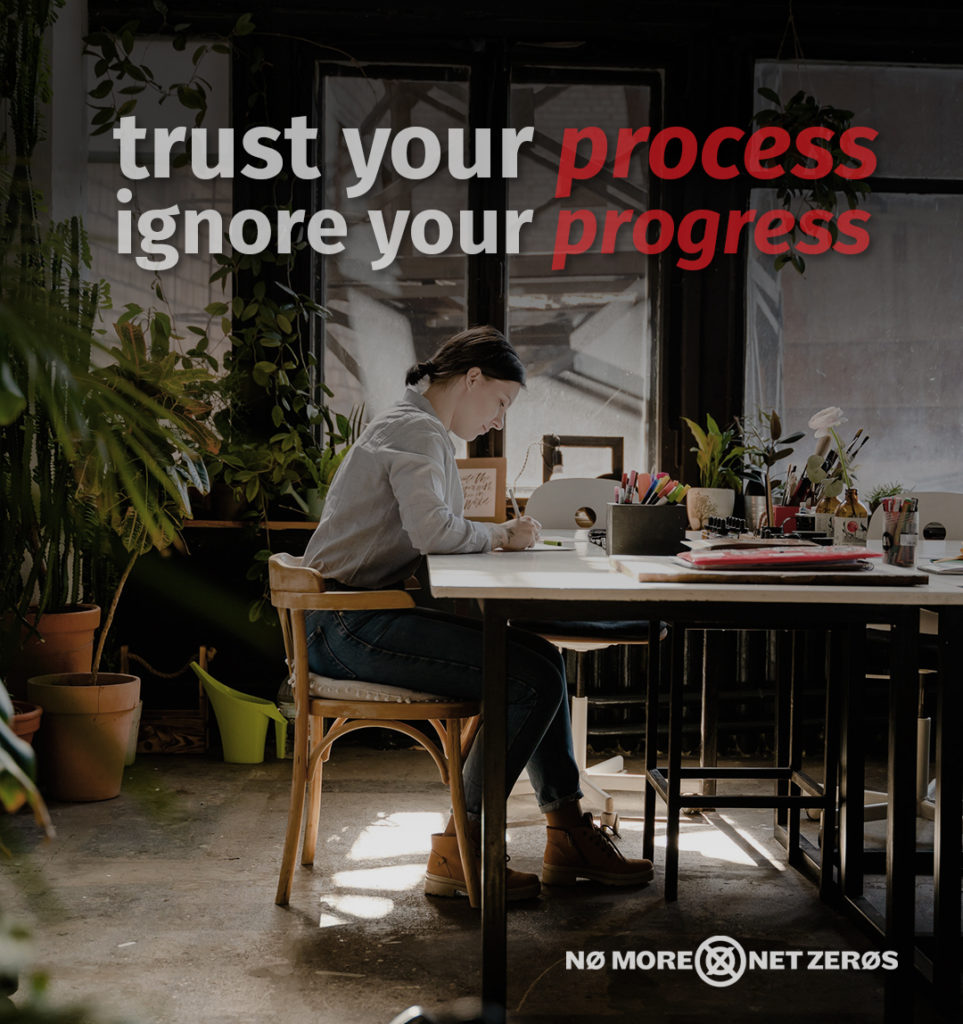
OF course, it IS still important to check progress.
But you should only check it infrequently, at scheduled intervals.
I recommend checking your progress monthly.
Set Monthly Goals
Set goals at the start of the month, then don’t check progress again until the end of the month.
If you hit your goals before the month’s over, celebrate the victory!
When the month is over, observe the journey behind you. Look at the view and see how far you’ve come. Think about the month. Challenges faced, overcome, etc.
Take a moment to breath that air. Feel proud of what you’ve done so far.
If there was a goal you didn’t achieve, That’s okay. Don’t be angry or upset about it.
Adjust your actions towards that goal for the next month. Then move on with enthusiasm to get it completed. You have a better chance of success this time around.
Set new goals for the next month.
Make them public if that motivates you.
I like to tweet my goals at the start of each month, and report progress to my followers at the end of the month.
Make sure the new goals are achievable within the month, for maximum motivation.
Daily Progress Wins the Race
It doesn’t matter how good of a runner you think you are. Show up on race day without training every single day, and your stamina levels won’t be able to cut it. Especially when racing against more experienced, better trained runners.
The win on race day, doesn’t start THAT day, ever.
It starts on the very first day you put on your running shoes, and commit to daily training.
Every mile you ran in training, supports you on the day you finally win.
In competitions as a pro skater, it was ALWAYS obvious who came prepared, and who didn’t.
Winners are on a whole different level.
When you train and prepare specifically for a competition, instead of just showing up on the day and hoping to do your best, it shows.
When goal setting and calculated progress are combined with daily habits, it’s a winning formula.
Business, and any success of any kind, even a savings plan, require all these things.
When you show up well trained on the day, muscle-memory and planned routine are all you need.
All you need to do is relax and do what you went there to do.
Here’s The ‘Never Quit’ Part
If you fail, or don’t do as well as you thought, it’s a simple matter of adjustment. Maybe your initial timeline, or daily calculated progress, need some adjustment.
That’s okay, nobody’s perfect. We almost never get things right first time.
So, you adjust and try again.
Remember, never TRY TOO HARD, always WORK HARD.
Adapt, and overcome.
Review
If you find yourself trying too hard, and getting burned out on a project, this is the plan of attack:
- Know the Destination
- Set a realistic timeline
- Plan the journey specifically. Break it down into smaller, easier pieces
- Plan your project, for focused, calculated momentum
- Make daily progress a habit
- Trust in the process, never check progress daily, or weekly
- Check progress monthly, and set monthly goals
- Check your journey so far, quarterly
- When you check your progress at the end of a year, or a project anniversary, decide whether to change course, or do something else entirely
Using this recipe for success and progress in ANYTHING at all, will work.
Whether you’re trying to build an emergency fund, achieve financial freedom, run a marathon, or learn to play your favorite song on guitar.
The above formula will work for you.
How Does No More Net Zeros Apply?
No More Net Zeros applies to this daily progress VERY specifically.
Each day you complete a task, following your process, you’re scoring a ‘ONE’.
Adding up your daily ONES, and producing as FEW ZEROS AS POSSIBLE, is No More Net Zeros at its very core.
If you need to learn a skill, earn more money, build a business, or achieve ANYTHING at all, this is the approach. All you need to do, is score consistent ones, and as few zeros, or even ‘minus ones’ as possible.
Scoring ones, makes it impossible for you to lose.
If you make it impossible to lose, you CAN’T LOSE.
Work every day, and you CAN’T FAIL.
Producing a daily ONE, beats once a week FOURS, every single time. With less effort, less thought, and without even trying to finish.
Don’t try too hard, get fried too hard, and die hard.
Work diligently, daily, and follow your process, without checking progress.
And remember…
…one more one, is one more done.


Recent Comments